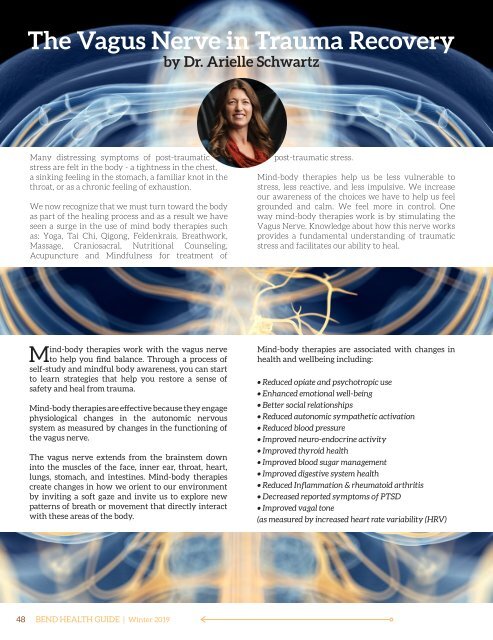You also want an ePaper? Increase the reach of your titles
YUMPU automatically turns print PDFs into web optimized ePapers that Google loves.
The Vagus Nerve in Trauma Recovery<br />
by Dr. Arielle Schwartz<br />
Many distressing symptoms of post-traumatic<br />
stress are felt in the body - a tightness in the chest,<br />
a sinking feeling in the stomach, a familiar knot in the<br />
throat, or as a chronic feeling of exhaustion.<br />
We now recognize that we must turn toward the body<br />
as part of the healing process and as a result we have<br />
seen a surge in the use of mind body therapies such<br />
as: Yoga, Tai Chi, Qigong, Feldenkrais, Breathwork,<br />
Massage, Craniosacral, Nutritional Counseling,<br />
Acupuncture and Mindfulness for treatment of<br />
post-traumatic stress.<br />
Mind-body therapies help us be less vulnerable to<br />
stress, less reactive, and less impulsive. We increase<br />
our awareness of the choices we have to help us feel<br />
grounded and calm. We feel more in control. One<br />
way mind-body therapies work is by stimulating the<br />
Vagus Nerve. Knowledge about how this nerve works<br />
provides a fundamental understanding of traumatic<br />
stress and facilitates our ability to heal.<br />
Mind-body therapies work with the vagus nerve<br />
to help you find balance. Through a process of<br />
self-study and mindful body awareness, you can start<br />
to learn strategies that help you restore a sense of<br />
safety and heal from trauma.<br />
Mind-body therapies are effective because they engage<br />
physiological changes in the autonomic nervous<br />
system as measured by changes in the functioning of<br />
the vagus nerve.<br />
The vagus nerve extends from the brainstem down<br />
into the muscles of the face, inner ear, throat, heart,<br />
lungs, stomach, and intestines. Mind-body therapies<br />
create changes in how we orient to our environment<br />
by inviting a soft gaze and invite us to explore new<br />
patterns of breath or movement that directly interact<br />
with these areas of the body.<br />
Mind-body therapies are associated with changes in<br />
health and wellbeing including:<br />
• Reduced opiate and psychotropic use<br />
Practices to Reset the Vagus Nerve<br />
• Enhanced emotional well-being<br />
• Better social relationships<br />
• Reduced autonomic sympathetic activation<br />
• Reduced blood pressure<br />
• Improved neuro-endocrine activity<br />
• Improved thyroid health<br />
• Improved blood sugar management<br />
• Improved digestive system health<br />
• Reduced Inflammation & rheumatoid arthritis<br />
• Decreased reported symptoms of PTSD<br />
• Improved vagal tone<br />
(as measured by increased heart rate variability (HRV)<br />
48 BEND HEALTH GUIDE | <strong>Winter</strong> <strong>2019</strong>


